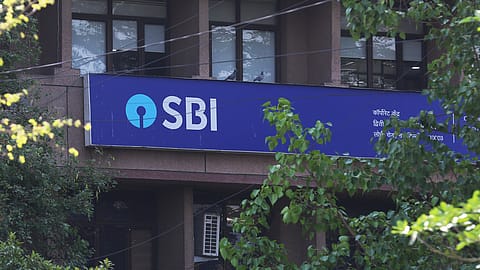Supreme Court directs SBI to submit unique numbers on electoral bonds
SBI gets a notice from Supreme Court for not sharing all details on electoral bonds

The Supreme Court on Friday directed India's largest public sector lender, State Bank of India (SBI) to share unique alpha-numeric numbers on electoral bonds.
"It has been submitted that SBI has not disclosed the unique electoral bond numbers," Chief Justice DY Chandrachud says, issuing a notice to the state-run lender.
Solicitor General Tushar Mehta, who appeared for the central government, told the apex court that since SBI was not a party in the electoral bonds case, they are not represented today. Mehta urged the court to issue notice to SBI before passing any order.
"SBI should be here. We can take exception to what they have disclosed," the chief justice notes.
"In our judgment, we had directed disclosures specifically on all details of the electoral bonds including the purchaser, the amount, and the date of purchase. They have not disclosed the bond numbers because that has to be disclosed by the State Bank of India," the chief justice remarks.
All details have to be furnished by the State Bank of India, the top court reiterates.
"The judgment of the Constitution Bench required SBI to furnish to ECI all details of the electoral bonds purchased and redeemed by political parties," the apex court says.
Recommended Stories
The Election Commission on Thursday evening released the data on electoral bonds that the State Bank of India shared with the poll body on March 12.
Earlier this week, the Supreme Court pulled up the State Bank of India for seeking more time to disclose the information on electoral bonds, warning that it may be inclined to proceed against India's largest lender for "wilful disobedience".
The apex court dismissed SBI's plea seeking an extension of time to June 30, saying that submissions of SBI indicate that the information sought is "readily available".
In a landmark judgment in February, the Supreme Court struck down the electoral bonds scheme for violating the right to information under Article 19(1)(a) of the Constitution. The scheme was introduced through the Finance Act, 2017 by amending the Companies Act, the Income Tax Act and the Representation of People Act. The court also held these amendments unconstitutional.
(INR CR)
"The ability of a company to influence the electoral process through political contributions is much higher when compared to that of an individual," the top court said in its unanimous verdict on February 15.
"A company has a much graver influence in the political process, both in terms of the quantum of money contributed to political parties and the purpose of making such contributions. Contributions made by individuals have a degree of support or affiliation to a political association. However, contributions made by companies are purely business transactions made with the intent of securing benefits in return," the Supreme Court said.
Advocacy groups have criticised electoral bonds for facilitating quid pro quo. Corporates were able to secretly bankroll political parties under the scheme.